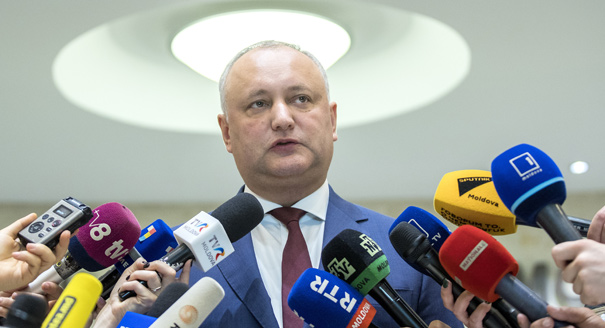Since being elected president of Moldova last fall, Igor Dodon has gotten plenty of attention from Vladimir Putin: the two presidents have met twice in person since November, and Dodon was the only head of state from the former Soviet Union to attend this year’s May 9 Victory Day parade in Moscow.
The meetings quickly paid dividends for Dodon. Moldovan residents who violated Russian immigration laws were granted the right to apply for amnesty (Dodon claims that no less than 10,000 Moldovans exercised the right before the May 12 deadline); Dodon was invited to the Supreme Eurasian Economic Council summit in April, at which Moldova was promised Eurasian Economic Union (EAEU) observer status, in no small part thanks to Russian efforts; and Moldovan wines produced by the state-owned Cricova winery, which has been embargoed by Russian authorities, will soon be allowed to return to Russian markets.
At first glance, it may look like Russia is supporting yet another post-Soviet leader simply because he seems inclined to enter into an exclusive “strategic partnership” with Moscow. But a careful look at Russia’s behavior vis-à-vis Moldova suggests Moscow realizes that its options in Moldova have become more limited in recent years, and has tempered its expectations accordingly.
Moldova is no longer vacillating between pursuing closer ties with the West and Russia, as it did from 2001 to 2009 under then president Vladimir Voronin. Moldova has grown increasingly dependent on certain EU institutions and member states, as well as on the United States in recent years. Western subsidies and low-interest loans to Chisinau total around 300 to 400 million euros per year and play an important role in supporting the Moldovan economy. Thus far, Russia has shown no signs of willingness to shoulder this financial burden.
The European idea is still going strong in Moldova, even if the country’s political class has done much to weaken it. In the second round of the presidential elections last fall, the nominee supported by both right-wing and pro-European parties garnered almost 50 percent of the vote despite being a relatively weak candidate.
Fears of Russia, which have intensified since the start of the Ukraine crisis, are further fueling pro-European sentiment. Similarly, the Transnistrian conflict remains unresolved, allowing local politicians to play the “Russia card.” Currently, around 70 percent of Moldovans oppose granting any degree of autonomy to Transnistria, seeing it as a region of the Moldovan state.
What’s more, Moldova’s foreign trade is now almost entirely oriented toward the EU. Though demand for Moldovan fruit and vegetables may be quite low in Europe, Moldovan grain, sunflower seeds, and even wine are gaining popularity in the EU. Europeans are also buying Moldovan manufactured goods produced at plants financed through European and Asian investments (primarily cables and wires and consumer goods).
At the end of 2016, Moldovan exports to the EU amounted to more than 1.3 billion euros, while Russia received just over 200 million euros worth of Moldovan goods. This is in part due to the rather serious trade restrictions Russia imposed in 2014 after Chisinau signed an association agreement with Brussels. After all, Moscow not only restricted the import of Moldovan wine and livestock products, but also effectively excluded Moldova from the Commonwealth of Independent States (CIS) free trade zone. Instead, Moldova was offered “most favored nation” status, which came with higher custom duties for key Moldovan exports.
Of course, Moldovan producers are still interested in the Russian market, but they no longer view it as essential, especially since stagnation in Russia has led to a decline in demand for food products.
Furthermore, the EU has decided to fully integrate Moldova into its single energy market. According to laws passed in the last year, Chisinau must comply with the norms set out in the Third Energy Package by 2020. These norms provide for splitting gas sales and transportation, which will most probably force Gazprom out of Moldova’s gas transport system.
Thanks to active lobbying on the part of the European Commission and the Romanian government, the EU is helping to complete the construction of a gas pipeline between Romania and Moldova by 2019, which will be capable of fully satisfying Moldova’s gas needs.
The Democratic Party of Moldova, which holds a majority in parliament, is fully pro-Western. Because of the current confrontation with Russia, it is important for the United States and, to some extent, the EU to ensure that parliament remains oriented toward the West even though it sees Moldova as a “captured state” in which power is concentrated in the hands of the oligarch and Democratic Party leader Vlad Plahotniuc. Without a parliamentary majority, Igor Dodon will have limited options unless he works with the Democratic Party.
What can Russia hope for in this situation? After all, even Moldova’s accession to the EAEU would hardly roll back Moldova’s economic integration and political association with the EU.
The history of Russian-Moldovan negotiations in the framework of the Intergovernmental Commission on Trade and Economic Cooperation suggests that a so-called “integration of integrations” is the way forward: Moscow is now hoping to find a way to let Moldova enjoy free trade agreements with both the EU and the EAEU.
Moscow has been trying to realize an “integration of integrations” in Moldova since the EU-Ukraine-Russia talks on combining the two free trade zones failed in 2015. This is important not only in the context of Russian relations with Moldova and Ukraine, but also for Russian relations with the EU. After all, dialogue between the EU and the EAEU is one of Moscow’s long-standing goals.
Now, Russia’s main goal is to help make Dodon and his Socialist Party strong enough that they can make strategic decisions without being dependent on the ruling parliamentary majority. In short, Moscow will offer Dodon its complete and unequivocal support only if he is able to strengthen his position in Moldovan politics and use it to build a new kind of strategic partnership with Russia.
